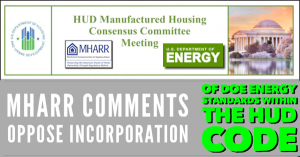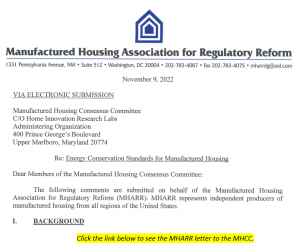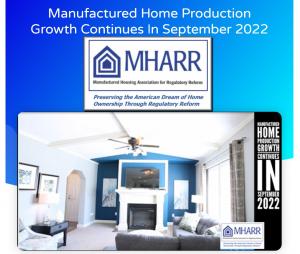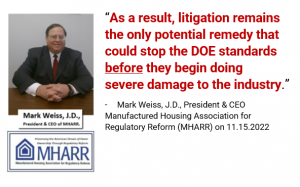Manufactured Housing Association for Regulatory Reform (MHARR) Urged MHCC to Oppose DOE Energy Rule Within HUD Code

Manufactured Housing Association for Regulatory Reform (MHARR) Comments Oppose Incorporation of DOE Energy Standards Within the HUD Code.

MHARR letter to the MHCC is at this link here: https://manufacturedhousingassociationregulatoryreform.org/wp-content/uploads/2022/11/MHARR.nov22mhccenergycomments-1.pdf
MHARR filed comments with the Manufactured Housing Consensus Committee (MHCC) to Oppose Inclusion of DOE manufactured home energy standards in the HUD Code.
Both the excessive cost of the DOE energy rule and its complete unsuitability for manufactured housing and the manufactured housing market, as well as the legal mangle now facing HUD (and DOE) with respect to the enforcement of the standards, could have been avoided if DOE had properly consulted with HUD and the MHCC – as required by section 413 of the Energy Independence and Security Act of 2007 (EISA) – from the very start. Instead, DOE unlawfully relegated such “consultation” to meaningless after-the-fact activity, while MHI urged and supported the sham “negotiated rulemaking” used by DOE and its energy/climate special interest allies to sidestep the type of real and legitimate consultation that could have avoided the current morass. Now, the industry faces the consequences of that instinct to “go along,” as the DOE energy standards are slated to go into effect on May 31, 2023.
While MHARR has called for MHI to lead an industry lawsuit to obtain an injunction against the DOE standards as the only available remedy that could be secured in time to stop those baseless and unlawful standards, MHI, instead, is stubbornly pursuing corrective legislation as part of a so-called “multi-pronged” strategy. In the wake of the November 8, 2022 election, however, it is – or should be – obvious that a legislative remedy is simply not in the cards, with razor-thin results in both houses guaranteeing that a presidential veto would be all but impossible to overturn (even if such legislation could ever be secured in the first place).
As a result, litigation remains the only potential remedy that could stop the DOE standards before they begin doing severe damage to the industry.
Consistent with this approach, MHARR’s comments strongly oppose the wholesale incorporation of the DOE standards within the HUD Code, or the incorporation of any “aligned” variant of the DOE standards without full notice and comment rulemaking as required by federal manufactured housing law.
MHARR will continue its consistent and aggressive opposition to the implementation of the excessively costly and destructive DOE manufactured housing energy standards and will continue to urge MHI-led industry legal action to enjoin those standards prior to their scheduled May 31, 2023 implementation date.
Manufactured Housing Association for Regulatory Reform (MHARR)
1331 Pennsylvania Ave N.W., Suite 512
Washington D.C. 20004
Phone: 202/783-4087
Fax: 202/783-4075
Email: MHARR@MHARRPUBLICATIONS.COM
Website: manufacturedhousingassociation.org
MHARR's detailed comments are attached at this link here.
About the Manufactured Housing Association for Regulatory Reform (MHARR)
MHARR is Protecting the American Dream of Home Ownership. We Bring Consumers, Industry Professionals, Public Officials and Media Common-Sense Solutions Others May Miss.
MHARR News
https://manufacturedhousingassociationregulatoryreform.org/mharr-news/
MHARR Monthly Manufactured Home Shipment Data
https://manufacturedhousingassociationregulatoryreform.org/category/manufactured-home-shipments/
MHARR's Objectives
https://manufacturedhousingassociationregulatoryreform.org/brief-history-and-objectives-of-the-manufactured-housing-association-for-regulatory-reform-mharr/
From the above: The Manufactured Housing Association for Regulatory Reform (MHARR) was established on July 3, 1985 as the “Association for Regulatory Reform” (ARR). The Association changed to its current name in the summer of 1997.
Based in Washington D.C. since its founding, MHARR was formed to represent the views and interests of producers of manufactured housing. A major source of the nation’s supply of non-subsidized affordable homes, the manufactured housing industry is federally regulated by the U.S. Department of Housing and Urban Development (HUD) — the only segment of the housing industry to be regulated at the federal level. MHARR is dedicated to maintaining a regulatory framework which promotes both the availability and affordability of manufactured housing — an objective now enshrined in federal law thanks to the Manufactured Housing Improvement Act of 2000, which MHARR successfully sought, promoted and advanced to enactment. Its primary and enduring mission is to protect, defend and advance the interests of its members and the manufactured housing lifestyle for American consumers of affordable housing.
Since MHARR’s establishment, the production of manufactured housing has become increasingly competitive and complex. As the industry has matured, numerous state and federal agencies have sought to impose rules and regulations that could significantly impact its cost and availability as a prime non-subsidized housing resource for Americans at every rung of the financial ladder.
Within the industry, the voice of manufacturers — the segment of the industry most directly affected by federal regulation — has tended to be merged with that of other segments of the industry, including retailers, suppliers, finance companies and community developers. Each such segment has its own specific interests and perspective, but unless manufacturers’ views can be articulated, published and advocated independently, the representation of those views is unavoidably weakened by being merged into an “umbrella” representation, which necessarily must be the lowest common denominator among various diverse segments of the industry.
The industry has also witnessed the emergence of a new type of manufacturer with large retailer and financing affiliates. That segment of the industry may also have different needs than smaller and medium-sized independent manufactures. Consequently, the primary objective of the Manufactured Housing Association for Regulatory Reform is to enunciate the consensus view of manufacturers, so that their experience, understanding and approach will be considered in the formulation of any law, rule standard or regulation that is imposed on the industry.
Necessarily, though, the interests of manufacturers – and consumers – are unavoidably impacted by activity and developments affecting the post-production sector of the industry (i.e., activity and developments affecting manufactured homes and consumers once such homes leave the factory). Such activity – by government or quasi-governmental actors – can negatively impact both the utilization and availability of manufactured homes for large segments of the public and can significantly constrain that availability, to the extreme detriment of all concerned. Current examples of this phenomenon include the failure of the Government Sponsored Enterprises (GSEs) to provide securitization and secondary market support for manufactured home loans in accordance with existing law and discriminatory and exclusionary zoning and placement restrictions on manufactured homes in many more densely-populated areas of the United States. Because of this indisputable reality and the fact that the long-term absence of any type of independent, dedicated national representation for the industry’s post-production sector has allowed such problems to multiply and fester, MHARR has taken (and will continue to take) the lead on these matters as well.
Ultimately, though, it is axiomatic that there is no regulation without economic cost — particularly for a federally regulated industry. That cost, inevitably, will be passed on to the purchaser. Overall, therefore, MHARR seeks an improved environment for the growth of the industry and for the availability of affordable manufactured housing to American consumers through fair, reasonable and cost-effective federal regulation. Furthermore, the Association is dedicated to reassessing all existing regulations periodically to determine their cost, merit and relevance, and to measuring each new law and regulation against the same criteria, with the principal objective of protecting manufactured housing consumers while simultaneously ensuring the continuing availability of safe, affordable, non-subsidized manufactured homes.
MHARR Issues and Perspectives
https://manufacturedhousingassociationregulatoryreform.org/category/mharr-issues-and-perspectives/
Recent MHARR headlines
https://manufacturedhousingassociationregulatoryreform.org/manufactured-housing-consensus-committee-mhcc-debates-doe-energy-standards/
https://manufacturedhousingassociationregulatoryreform.org/manufactured-housing-association-for-regulatory-reform-mharr-provides-october-2022-meeting-insights-with-senior-hud-officials/
https://manufacturedhousingassociationregulatoryreform.org/washington-d-c-updates-on-manufactured-housing-issues-including-doe-energy-assault-hud-moving-on-doe-standards-mh-financing-mh-white-paper-and-more/
Manufactured Home Production Growth Continues in September 2022
November 4, 2022
https://manufacturedhousingassociationregulatoryreform.org/manufactured-home-production-growth-continues-in-september-2022/
Manufactured Housing Consensus Committee (MHCC) Debates DOE Energy Standards
October 24, 2022
https://manufacturedhousingassociationregulatoryreform.org/manufactured-housing-consensus-committee-mhcc-debates-doe-energy-standards/
Manufactured Housing Association for Regulatory Reform (MHARR) Provides October 2022 Meeting Insights with Senior HUD Officials
October 6, 2022
https://manufacturedhousingassociationregulatoryreform.org/manufactured-housing-association-for-regulatory-reform-mharr-provides-october-2022-meeting-insights-with-senior-hud-officials/
Mark Weiss, J.D., President & CEO
Manufactured Housing Association for Regulatory Reform
+1 202-783-4087
email us here
Visit us on social media:
Facebook
Twitter
LinkedIn
Other
Legal Disclaimer:
EIN Presswire provides this news content "as is" without warranty of any kind. We do not accept any responsibility or liability for the accuracy, content, images, videos, licenses, completeness, legality, or reliability of the information contained in this article. If you have any complaints or copyright issues related to this article, kindly contact the author above.



